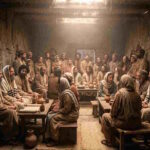Is Thanksgiving Rooted in a Biblical Festival? – Mario Seiglie ucg.org
Did you know the first Thanksgiving in the U.S. shares striking similarities with the biblical Feast of Tabernacles? While the Pilgrims didn’t intentionally observe this biblical festival, both celebrations share a spirit of gratitude to God for His blessings.
Both take place in autumn and center on thanking God for a fruitful harvest. The Pilgrims, deeply rooted in biblical teachings, were profoundly influenced by the Hebrew Scriptures. Jewish sources often note parallels between Thanksgiving and Sukkot, the Hebrew name for the Feast of Tabernacles.
Historian Barney Kasdan explains, “Sukkot was a time of bringing in the latter harvest… It is widely believed that the Puritan settlers, who were great students of the Hebrew Scriptures, based the first American Thanksgiving on Sukkot” (God’s Appointed Times, 1993).
The Pilgrims rejected England’s pagan-tainted Harvest Home celebrations. Instead, their biblical framework shaped Thanksgiving, inspired by practices such as feasting and praising God for His providence, echoing Israel’s harvest traditions. Governor William Bradford, a Pilgrim leader, drew from both the Old and New Testaments to guide his colony.
This influence extended beyond the Pilgrims. Puritans in New England structured their communities and laws on Old Testament principles, viewing themselves as a modern-day “chosen people” entering a Promised Land.
Thanksgiving reminds us to be grateful—not only for God’s blessings today but for His foundational role in shaping America. Reflecting on biblical traditions can deepen our appreciation for the holiday’s origins and its enduring call to honor God for His goodness.
#Thanksgiving #FaithAndHistory #FeastOfTabernacles #Gratitude
Report Story




